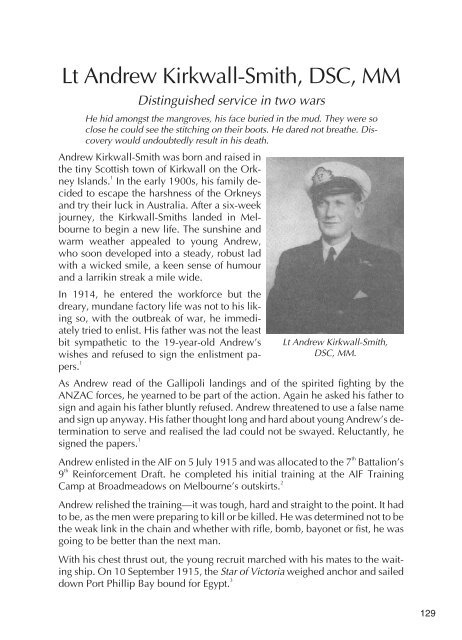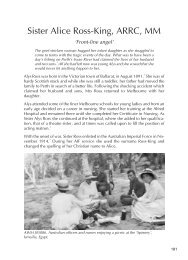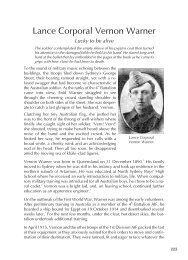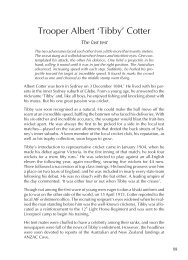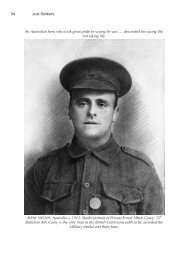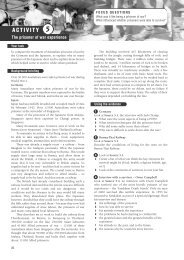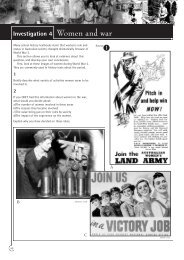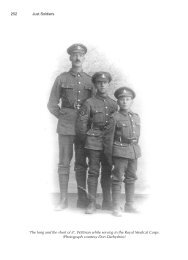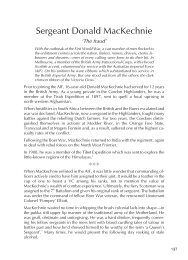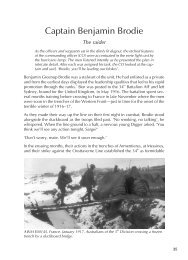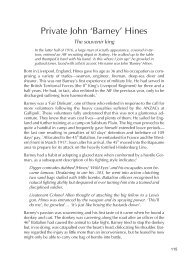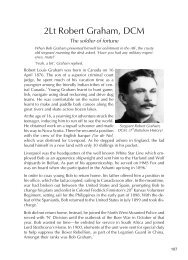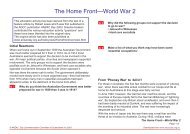Lt Andrew Kirkwall-Smith, DSC, MM
Lt Andrew Kirkwall-Smith, DSC, MM
Lt Andrew Kirkwall-Smith, DSC, MM
Create successful ePaper yourself
Turn your PDF publications into a flip-book with our unique Google optimized e-Paper software.
<strong>Lt</strong> <strong>Andrew</strong> <strong>Kirkwall</strong>-<strong>Smith</strong>, <strong>DSC</strong>, <strong>MM</strong><br />
Distinguished service in two wars<br />
He hid amongst the mangroves, his face buried in the mud. They were so<br />
close he could see the stitching on their boots. He dared not breathe. Discovery<br />
would undoubtedly result in his death.<br />
<strong>Andrew</strong> <strong>Kirkwall</strong>-<strong>Smith</strong> was born and raised in<br />
the tiny Scottish town of <strong>Kirkwall</strong> on the Orkney<br />
Islands. 1 In the early 1900s, his family decided<br />
to escape the harshness of the Orkneys<br />
and try their luck in Australia. After a six-week<br />
journey, the <strong>Kirkwall</strong>-<strong>Smith</strong>s landed in Melbourne<br />
to begin a new life. The sunshine and<br />
warm weather appealed to young <strong>Andrew</strong>,<br />
who soon developed into a steady, robust lad<br />
with a wicked smile, a keen sense of humour<br />
and a larrikin streak a mile wide.<br />
In 1914, he entered the workforce but the<br />
dreary, mundane factory life was not to his liking<br />
so, with the outbreak of war, he immediately<br />
tried to enlist. His father was not the least<br />
bit sympathetic to the 19-year-old <strong>Andrew</strong>’s<br />
wishes and refused to sign the enlistment papers.<br />
1<br />
<strong>Lt</strong> <strong>Andrew</strong> <strong>Kirkwall</strong>-<strong>Smith</strong>,<br />
<strong>DSC</strong>, <strong>MM</strong>.<br />
As <strong>Andrew</strong> read of the Gallipoli landings and of the spirited fighting by the<br />
ANZAC forces, he yearned to be part of the action. Again he asked his father to<br />
sign and again his father bluntly refused. <strong>Andrew</strong> threatened to use a false name<br />
and sign up anyway. His father thought long and hard about young <strong>Andrew</strong>’s determination<br />
to serve and realised the lad could not be swayed. Reluctantly, he<br />
signed the papers. 1<br />
<strong>Andrew</strong> enlisted in the AIF on 5 July 1915 and was allocated to the 7 th Battalion’s<br />
9 th Reinforcement Draft. he completed his initial training at the AIF Training<br />
Camp at Broadmeadows on Melbourne’s outskirts. 2<br />
<strong>Andrew</strong> relished the training—it was tough, hard and straight to the point. It had<br />
to be, as the men were preparing to kill or be killed. He was determined not to be<br />
the weak link in the chain and whether with rifle, bomb, bayonet or fist, he was<br />
going to be better than the next man.<br />
With his chest thrust out, the young recruit marched with his mates to the waiting<br />
ship. On 10 September 1915, the Star of Victoria weighed anchor and sailed<br />
down Port Phillip Bay bound for Egypt. 3 129
130 Just Soldiers<br />
In the sands surrounding Mena Camp, <strong>Andrew</strong> threw himself into his final training.<br />
He knew that his next stop was Gallipoli and the war, and he again vowed<br />
that he would be ready.<br />
<strong>Andrew</strong> finally landed at ANZAC Cove on 7 December—at last he was at the<br />
front and spoiling for a stoush. Ironically, it was the day before the British Government<br />
made the inevitable decision to withdraw all forces from the Gallipoli<br />
Peninsula. 4<br />
<strong>Kirkwall</strong>-<strong>Smith</strong> felt that he had been robbed of his right to fight. He yearned to be<br />
part of the action and when word came that the 7 th was to be split to form a new<br />
AWM ART03004. Longstaff, Will, 1919 ‘Australian 9.2 howitzer’ Oil on canvas, 92 x 153 cm .<br />
Although ‘Australian 9.2 howitzer’ was painted in 1919, immediately after the war, it<br />
clearly represents a scene from the last phase of the fighting. The centrepiece is a large<br />
howitzer, the heaviest gun used by the Australian siege batteries. It is appropriate that<br />
Longstaff recorded the artillery because massed artillery barrages, with infantry and<br />
tanks, were an essential element in finally breaking the stalemate on the Western<br />
Front. The howitzer was a hard taskmaster for the artillerymen. Longstaff’s painting<br />
shows four gunners straining to ram home another shell. The men are stripped to the<br />
waist, reflecting the exertion of their task and the hot, dry weather that was so<br />
characteristic of that time. The gun and artillerymen have been portrayed hidden<br />
under camouflage netting. The shade emphasises the sinister bulk of the gun and<br />
contrasts sharply with the surrounding brilliant sunlight. For Longstaff this would have<br />
been a familiar scene, as he would have been trained in camouflage work and was<br />
officer in charge of camouflage for the 2 nd Division, Australian Imperial Force. The<br />
camouflage was an essential precaution at this stage of the war, as each side tried to<br />
conceal the nature and extent of its artillery.
Lieutenant <strong>Andrew</strong> <strong>Kirkwall</strong>-<strong>Smith</strong>, <strong>DSC</strong>, <strong>MM</strong> 131<br />
AWM E00717. A loaded limber passing the ruins of the Cloth Hall at Ypres. Note the<br />
three artillery drivers astride their horses.<br />
battalion, the 59 th , he jumped at the chance to serve. He spent a short time in another<br />
battalion, the 60 th , before a call went out for volunteers to join one of the<br />
fast-growing artillery brigades. These units were being hastily formed for service<br />
in France. It was the promise of action that appealed to <strong>Andrew</strong> and he went for<br />
it like a shot. 2<br />
He was allocated to the 13 th Field Artillery Brigade’s 113 th Howitzer Battery and<br />
arrived in France in June of 1916. 2 He loved the guns. They were good, reliable<br />
weapons that, when the call for fire was initiated, could deliver their projectiles<br />
with deadly accuracy.<br />
He fought through the winter of 1916–17, through Bapaume, and towards the<br />
impregnable Hindenburg Line. He was a cool, efficient soldier who showed his<br />
worth both in battle and when enjoying a break in the billets. His efforts were rewarded<br />
with promotions to lance bombardier and bombardier respectively. 2<br />
In late August 1917, 13 Field Artillery Brigade was advancing towards Ypres. 5<br />
The guns were already in action and ammunition was vitally needed to feed the<br />
hungry breeches. At this time, <strong>Andrew</strong> <strong>Kirkwall</strong>-<strong>Smith</strong> was part of a resupply column<br />
which had its limbers filled with ammunition.<br />
As the horses pulling the limbers galloped forward, the men with them were unaware<br />
that their every move was being watched by a German observation party.<br />
Suddenly the Diggers heard the scream of incoming rounds. The German
132 Just Soldiers<br />
AWM E03497. Limbers of the 6 th Brigade of Australian Field Artillery bringing up<br />
ammunition to the guns through the Hindenburg Line near Bellicourt.<br />
gunners had the road registered to within a few metres and sent a barrage of 4.2<br />
and 5.9 inch shells to destroy the valuable ammunition.<br />
Deadly red-hot splinters tore into both drivers and horses alike. Many of the Diggers<br />
were wounded and three gunners lay dead in their seats. The surviving<br />
panic-stricken horses struggled to escape the torrent of fire, hindered by the<br />
weight of dead and wounded animals still harnessed to the wagons.<br />
Galloping forward, <strong>Kirkwall</strong>-<strong>Smith</strong> took control of the situation as he and a<br />
driver by the name of Brown jumped from their horses and set about freeing the<br />
men and animals. 6 ‘Brownie, you get the boys to some cover while I try to get this<br />
lot out of here’, he ordered.<br />
Whipping out his pocket knife, <strong>Kirkwall</strong>-<strong>Smith</strong> went to work. He cut the harnesses<br />
of the dead and wounded animals free, and then shooed the remaining<br />
teams forward and away from the killing ground. 6<br />
With shells bursting all around him <strong>Kirkwall</strong>-<strong>Smith</strong> continued his work. As he<br />
freed the last dying animal, an officer galloped forward with <strong>Smith</strong>’s mount,<br />
‘Good work, Andy; looks like we saved a few. Now let’s get the hell out of here!’<br />
the lieutenant screamed.<br />
For his actions that afternoon, Bombardier <strong>Andrew</strong> <strong>Kirkwall</strong>-<strong>Smith</strong> was awarded<br />
the Military Medal, with a portion of the citation reading ‘showed utter disregard<br />
for his own safety, as well as setting a splendid example…’ 6
Lieutenant <strong>Andrew</strong> <strong>Kirkwall</strong>-<strong>Smith</strong>, <strong>DSC</strong>, <strong>MM</strong> 133<br />
In April 1918, <strong>Kirkwall</strong>-<strong>Smith</strong> was promoted to the rank of sergeant. He continued<br />
to serve with distinction until the war’s end that November. Following the cessation<br />
of hostilities, he decided to stay for a while in England and France. <strong>Andrew</strong><br />
took full advantage of the soldier-education programs, studying European farming<br />
techniques. 2 He also visited the place of his birth in Scotland. He returned to Australia<br />
on the troopship Orontes and was finally discharged in August 1919. 2<br />
The lust for adventure was still in Andy’s blood and he chose to seek a life in the<br />
wild, untamed jungles of New Guinea. He purchased a plantation on the<br />
north-east coast, near Rai and proceeded to lead a very quiet life until the early<br />
40s—totally oblivious to the growing Japanese presence in the Pacific. 1<br />
<br />
Suddenly the cauldron boiled over, and the radio brought the news of the attacks<br />
on Pearl Harbor, Malaya and the Philippines. Though <strong>Andrew</strong> was now aware of<br />
the impending conflict, he was quite confident that the mighty naval base at Singapore<br />
would stem the Japanese tide and secure the British bastion in Asia.<br />
But <strong>Andrew</strong> had misjudged the tenacity of the enemy as the tentacles of the Japanese<br />
Empire continued to spread south, finally threatening the north-eastern<br />
coast of the island. Anticipating the approaching danger, <strong>Kirkwall</strong>-<strong>Smith</strong> destroyed<br />
everything that could be of use, loaded up his battered schooner and<br />
sailed to the nearby harbour of Madang. 1<br />
He arrived off the harbour entrance in time to see the retiring Japanese bombers<br />
that had just devastated the area. As he tied up alongside what remained of the<br />
wharf, he was met by a sergeant of the New Guinea Volunteer Rifles who was in<br />
charge of a small contingent tasked with guarding the nearby airfield. The sergeant’s<br />
name was Emery and the two would soon become firm friends. 1<br />
Despite his age, Andy was enlisted into the New Guinea Volunteer Rifles. 1 His<br />
intimate knowledge of the islands would prove invaluable to the Allied cause.<br />
He was soon involved in a number of dangerous covert missions behind the<br />
lines, hell-bent on keeping the Japanese off-guard. One operation included the<br />
evacuation, by small ship, of refugees from the beleaguered outpost of Rabaul,<br />
under the very noses of the Japanese.<br />
As the Japanese web closed around <strong>Kirkwall</strong>-<strong>Smith</strong> and Emery, they decided to<br />
attempt to reach the safety of the Allied lines, taking their chances travelling<br />
across country rather than by ship.<br />
After arriving in Port Moresby, the two parted company and <strong>Andrew</strong>, now a<br />
Warrant Officer Class Two, was selected to become a coastwatcher. 5 He was<br />
sent to his old stamping grounds in the Rai area where, from his concealed vantage-point,<br />
he observed and reported on troop, aircraft and ship movements<br />
around Buna and the neighbouring islands.
134 Just Soldiers<br />
In early 1943, he received orders to take up a post at Cape Gloucester, in New<br />
Britain. His mission was to monitor the enemy build-up in preparation for the US<br />
Marine landings scheduled for later that year.<br />
Accompanied by a small party of loyal natives, <strong>Andrew</strong> carried out a close reconnaissance<br />
of enemy fortifications by canoe. As they returned to the safety of<br />
their hideout, they were ambushed by a barge-load of Japanese soldiers. The<br />
party was helpless against such odds, but <strong>Andrew</strong> managed to escape the carnage<br />
that followed by diving overboard and swimming to the nearby bank. Unarmed<br />
and barefoot, he hid in the mangroves, playing a game of cat and mouse<br />
with the searching Japanese. Over the ensuing days, he made his way overland,<br />
headed for the outpost of a fellow coastwatcher. 1 Days later, he stumbled into<br />
the camp, suffering from sickness, exhaustion, and with his bare feet cut to ribbons<br />
by the harsh jungle vegetation.<br />
With little time to rest and recuperate and with the Japanese hot on <strong>Andrew</strong>’s<br />
trail, the pair made their way across the strait to New Guinea by small boat<br />
where they met up with a group of survivors attempting to cross overland to the<br />
Allied lines. <strong>Andrew</strong> immediately took charge of the group and led them across<br />
the mountains to safety. 1<br />
It was now late 1943 and <strong>Andrew</strong> left the army and took up a commission in the<br />
Royal Australian Naval Volunteer Reserve. 7 With his knowledge of the beaches<br />
and unpredictable currents, <strong>Kirkwall</strong>-<strong>Smith</strong> was seconded to the newly formed<br />
Amphibious Force. He again returned to Cape Gloucester to report on the enemy<br />
build-up as the Japanese prepared to oppose the marines. After nearly two<br />
weeks in the area, much of it under the very noses of the Japanese, he was evacuated<br />
by an American patrol boat to pass on this vital information to his superiors. 1<br />
A number of US landings occurred along the island chain, designed to cut off and<br />
starve out sections of the Japanese force. <strong>Andrew</strong> was now attached to the Americans,<br />
to act as a guide for long-range patrols into the depths of the jungle. Their<br />
mission was to report on the likelihood of Japanese resistance and identify possible<br />
evacuation routes. On one such patrol, the commander was seriously<br />
wounded in a skirmish and <strong>Andrew</strong> was called upon to take charge. It was due to<br />
his outstanding leadership that the patrol was able to break contact and extract<br />
themselves—along with the wounded—and return to the safety of their own lines.<br />
In early 1945, <strong>Andrew</strong> learnt he had been awarded the coveted Distinguished<br />
Service Cross for ‘bravery and enterprise in reconnaissance operations…’ 8<br />
As the Allied noose tightened around the Japanese forces, the end of the war was<br />
in sight. Like others, <strong>Andrew</strong> read of the atomic bomb attacks on the Japanese<br />
cities of Hiroshima and Nagasaki and he joined in celebrations as the war in the<br />
Pacific spluttered to an end.<br />
He took his discharge in December 1945.
Lieutenant <strong>Andrew</strong> <strong>Kirkwall</strong>-<strong>Smith</strong>, <strong>DSC</strong>, <strong>MM</strong> 135<br />
AWM 304757. Goodenough Island, New Guinea. 1 Jan 1944. Allied Intelligence<br />
Bureau (AIB) Personnel at AIB Headquarters—included in the photograph is Sub<br />
Lieutenant A. <strong>Kirkwall</strong>-<strong>Smith</strong> RANVR.<br />
A pleasant surprise came to <strong>Kirkwall</strong>-<strong>Smith</strong> in the form of a letter from the Director<br />
of Naval Intelligence in which he said: ‘You have made history. Your work as<br />
a coastwatcher had a direct bearing upon operations and, in the opinion of the<br />
highest ranking Allied officers, was invaluable’. 1 On 13 November 1946, <strong>Andrew</strong><br />
stood before the Governor-General of Australia to be invested with his Distinguished<br />
Service Cross.<br />
Post-war, he again returned to the land, this time in Victoria. This gallant soldier/<br />
sailor passed away on 7 January 1973 and was laid to rest in the Swan Hill<br />
Cemetery. 1<br />
Notes<br />
1 Article by Michael Downey, date and origin unknown, in possession of author<br />
2 National Archives of Australia: B2455, WW1 Service Records, A <strong>Kirkwall</strong>-<strong>Smith</strong>, <strong>MM</strong><br />
3 AWM 8, Unit Embarkation Nominal Rolls, 7 th Battalion AIF, 1914–1918 War<br />
4 Dean A & Gutteridge EW, The Seventh Battalion, A.I.F : Resume of the Activities of the Seventh Battalion in the<br />
Great War, 1914-1918, W&KPurbrick, Melbourne, 1933<br />
5 Bean, CEW, The Official History of Australia in the War of 1914–1918, Volume IV, Australian War Memorial,<br />
Canberra, 1936<br />
6 AWM 28, Recommendation Files for Honours and Awards, AIF, 1914–1918<br />
7 National Archives of Australia, WW2 Service Records, P456 Private A <strong>Kirkwall</strong>-<strong>Smith</strong><br />
8 RAN Honours and Awards, World War 2, A <strong>Kirkwall</strong>-<strong>Smith</strong>


